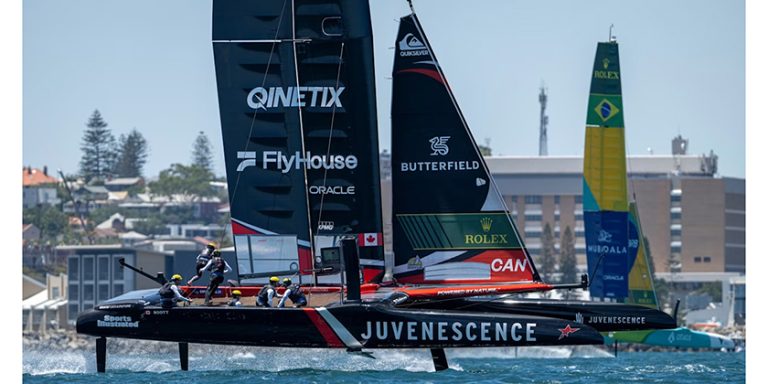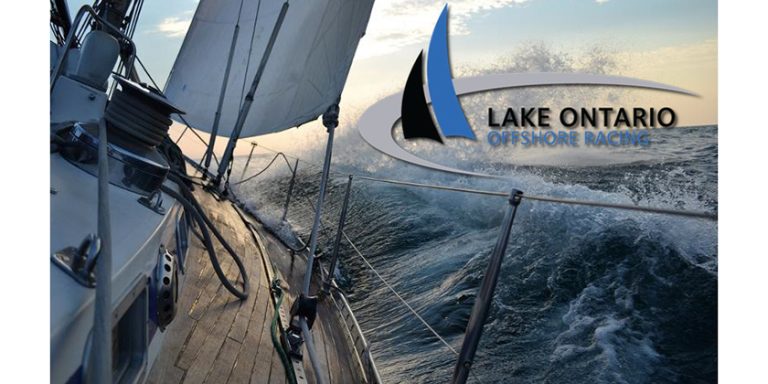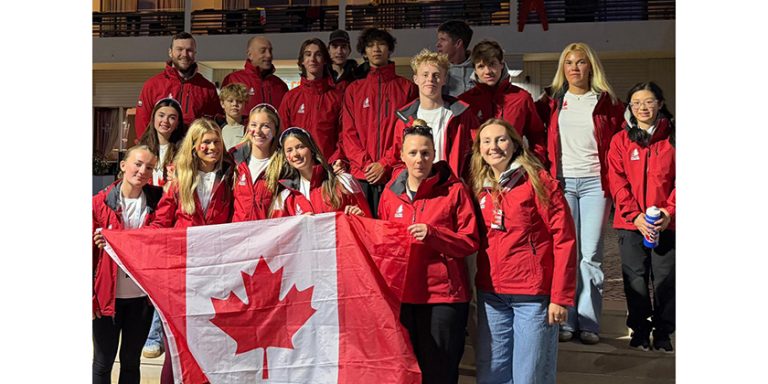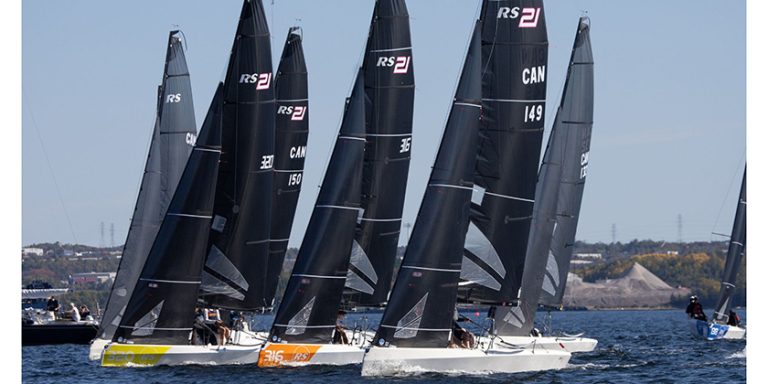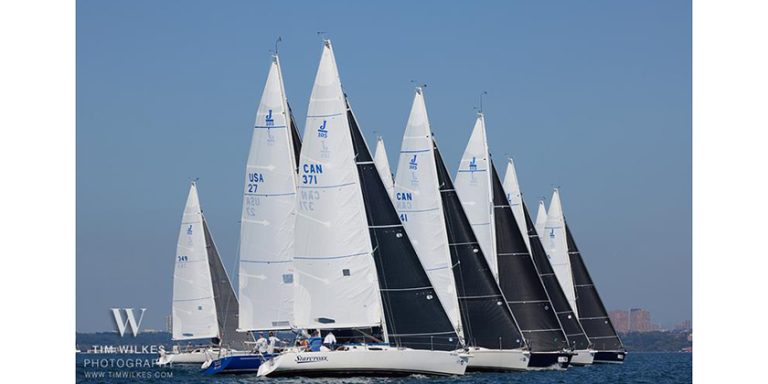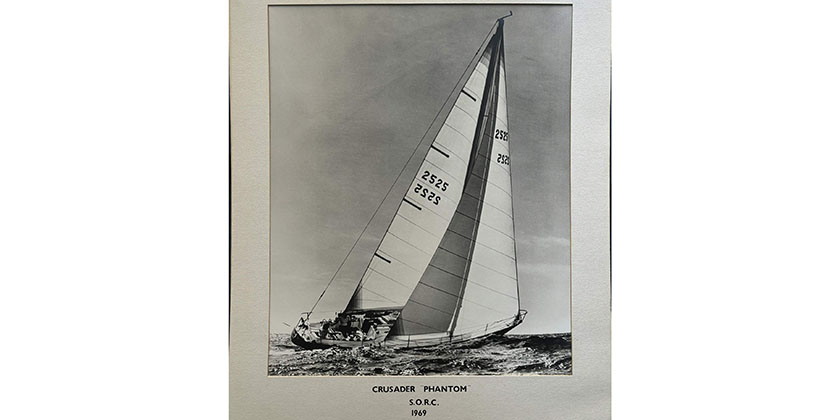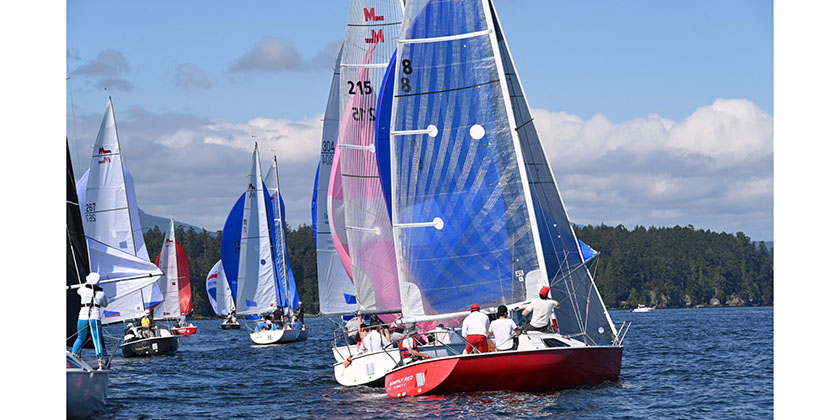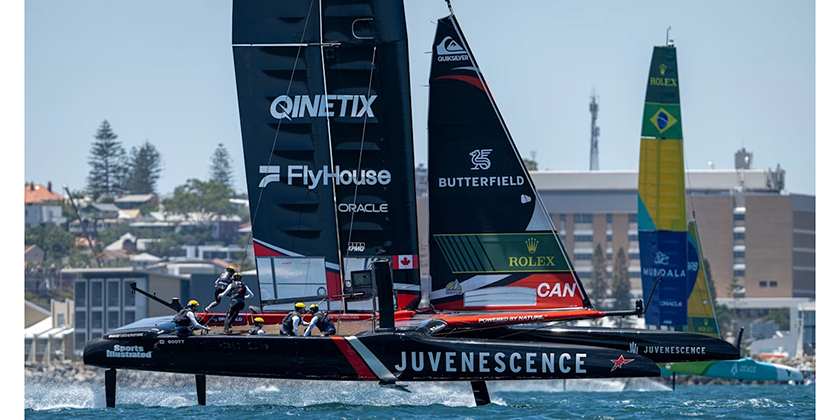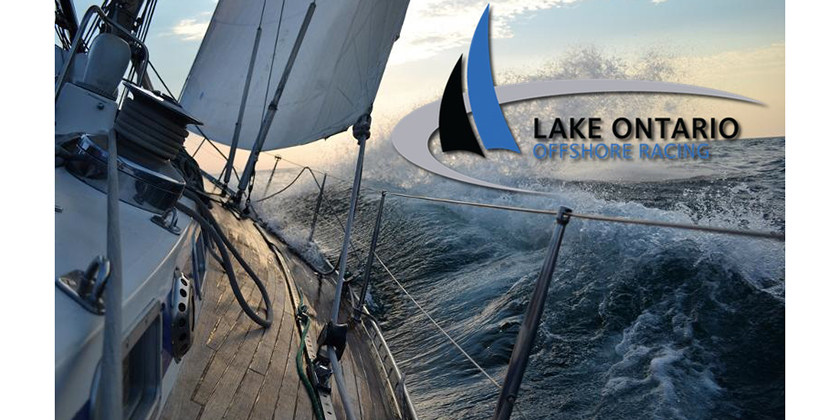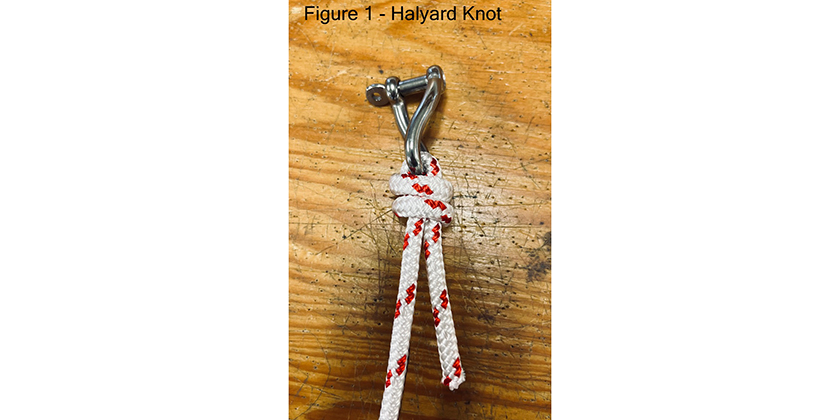Kevin and Lorraine Anderson and their mini 12’s, Thing one and Thing two.
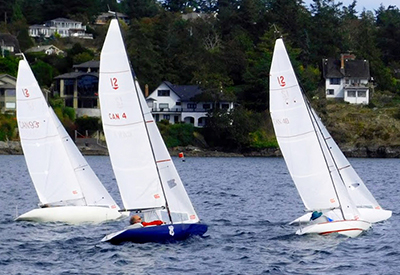
Sept 13, 2017
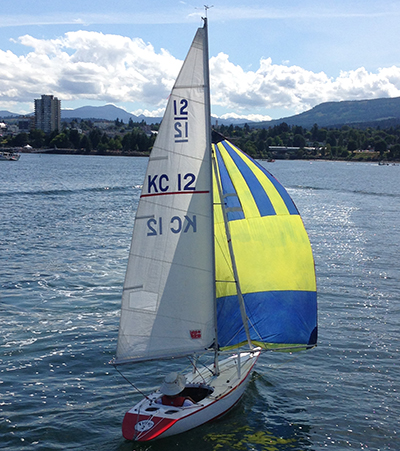
The Snake Island Nanaimo Regatta kicks off each year with a social mixer at the end of their main dock. Part of the activities includes adult racing in Opti’s. This was also a chance for Kevin and Lorraine Anderson to let club members and guests try out their two Mini 12’s “Thing one and Thing two”. I just had to ask Kevin and Lorraine about what drew them to the Mini 12’s. Here is what Kevin had to say:
It all began when I was sailing at the Royal Victoria Yacht Club and saw my first Mini 12 sailing around the bay. I was not able to get a close look but a seed was planted in my mind. I forgot about them for a time. At another event, I had a chance to see a Mini 12 up close. I liked that they had all the sailing controls that you would expect to see on a full-sized race boat. Now I was really interested in finding out more.
A quick internet search told me the basics. A one-design like the Olympic 2.4-meter class. LOA 3.66 m, beam 0.84m Draft 0.69m Displacement 318 kg, sail area /disp.1 = 13.01 and a 45-sq. ft. spinnaker.
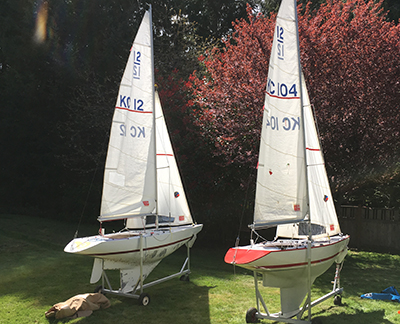 There were 900 of the boat build starting in 1981. They have a class website http://www.illusionclass.org/ for more info. YouTube was a wonderful place to see them in action. There were lots of video that showed the boats racing and just sailing around. One guy was in 50 knots of wind – wow he is crazy.
There were 900 of the boat build starting in 1981. They have a class website http://www.illusionclass.org/ for more info. YouTube was a wonderful place to see them in action. There were lots of video that showed the boats racing and just sailing around. One guy was in 50 knots of wind – wow he is crazy.
My wife and I had been active with the Nanaimo Yacht club since we moved from Calgary five years ago. Our 34-foot West Coaster is not exactly a race boat and we could only participate in very limited number of events.
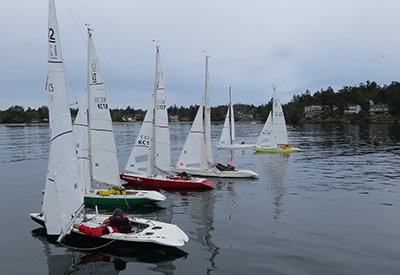 We know the best way to improve our sailing skills is racing. The club race events were starting to have fewer and fewer boats. Most weekend we were down to two or three boats. The thought of the Mini 12 was always in the back of my mind, wouldn’t it be great to have a bunch of them here in Nanaimo. The 12 people it takes to run the three keel boats would translate into ten Mini 12 race boats just off the dock in the harbour. I know that this would not be for everyone but they would get some of the racers out that have had difficulty getting crew and may even have lost the ability to sail a full-sized race boat but are still interested in racing. We had a lot of conversation about Mini 12 with other yacht club members.
We know the best way to improve our sailing skills is racing. The club race events were starting to have fewer and fewer boats. Most weekend we were down to two or three boats. The thought of the Mini 12 was always in the back of my mind, wouldn’t it be great to have a bunch of them here in Nanaimo. The 12 people it takes to run the three keel boats would translate into ten Mini 12 race boats just off the dock in the harbour. I know that this would not be for everyone but they would get some of the racers out that have had difficulty getting crew and may even have lost the ability to sail a full-sized race boat but are still interested in racing. We had a lot of conversation about Mini 12 with other yacht club members.
I decided that I needed to try one out just to see if it was something for me. So, I called the fleet caption at the Royal Victoria Yacht club and arranged for five NYC members and myself to get out on the water and try out these boats. It was a rainy day but after four hours of sailing and racing we didn’t even notice the rain. Thanks to the RVYC for letting us try out their race boats. They even setup some short races for us to really get the feeling of the boats. See YouTube of the day we were sailing. https://www.youtube.com/watch?v=ZMdbTgR2Etk The day was filled with laughter and fun for all that came out that day in the rain.
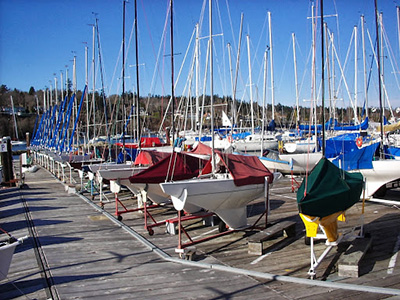 Now I really wanted to see if we could get some at the Nanaimo Yacht club. There was some interest but it was mostly curiosity. So, I thought that if I could get my own boat at the club I could really start to build some interest in starting a fleet, someone must be first, why not me. I started looking for boats to buy nothing was on the market near Nanaimo. I also looked at other small boats Minuet http://www.sksa-ltd.com/dam/minuet.htm and Deceptions. Then a friend noticed a Mini 12 posted on Kijji. We looked up the post and contacted the owner in Comox. Then set up a time to look at the boat. It was in great shape and a decent price with two sets of sails. We bought it on the spot and loaded it in the back of the truck. We mentioned that we needed to find a second boat to race. The seller said he knew a guy that knew a guy that might want to sell. So, we said give him our info. In 2 days, we got a call from the other guy wanting to sell his mini 12. We drove up to Comox the next weekend to look at his mini 12 it was in a bit rougher shape but the price was right and it also had 2 set sets of sails. We bought that one too. Now we had a fleet. One for me and one for my wife.
Now I really wanted to see if we could get some at the Nanaimo Yacht club. There was some interest but it was mostly curiosity. So, I thought that if I could get my own boat at the club I could really start to build some interest in starting a fleet, someone must be first, why not me. I started looking for boats to buy nothing was on the market near Nanaimo. I also looked at other small boats Minuet http://www.sksa-ltd.com/dam/minuet.htm and Deceptions. Then a friend noticed a Mini 12 posted on Kijji. We looked up the post and contacted the owner in Comox. Then set up a time to look at the boat. It was in great shape and a decent price with two sets of sails. We bought it on the spot and loaded it in the back of the truck. We mentioned that we needed to find a second boat to race. The seller said he knew a guy that knew a guy that might want to sell. So, we said give him our info. In 2 days, we got a call from the other guy wanting to sell his mini 12. We drove up to Comox the next weekend to look at his mini 12 it was in a bit rougher shape but the price was right and it also had 2 set sets of sails. We bought that one too. Now we had a fleet. One for me and one for my wife.
The Rebuild started with inspecting the two boats. We setup both boats in the yard and rigged them. It was surprising how different they were in the rigging details. Each owner must have made changes and over time the changes added up. Hull 104 was in decent shape almost ready to sail. The Rudder had a crack in the leading edge. Some grinding and a bit of fiber glass and paint the repair was completed. Since the rudder is only about 12 inches long the repair was like fixing a model boat. Some trim paint touch-ups and replacement of the older turnbuckles. The sails were in great shape one set for practice and one set almost new for racing. Hull 104 was ready to go.
Hull 12 was a different story it had a bit of a harder life. The hull was covered in paint blisters. The leading edge of the keel had visible damage. The rudder had a split down the leading edge. I was concerned about hidden damage the port side was rippled and looked like some damage had been repaired in the past. The bow was about an inch shorter then 104 figured that it had been in some racing starboard port protests a few times. The rigging was in sorry shape. All the stays were connected to one turnbuckle on each side this added a lot of load to the middle stay as it was cut shorter then the other 2 this caused the lower spreader to bend up about 20 degrees. Numerus kinks and corrosion meant that all the wire and spreaders needed to be replaced. The lower end of the mast was covered with a fiberglass reinforcement and one of the opening had been covered. I had my work cut out for me.
I started working on Hull 12 by setting up a work space in the back yard under the wood shed roof. Turned the boat upside down on a couple of saw horses and did a close inspection by probing a few spots. Decided to remove all the paint to find any hidden damage. My wife removed the bulk of paint with a scraper and I removed the rest with an orbital sander. This only took a few evenings and revealed the history of the boat. Just as I had guessed the boat had been hit 2 times on the port side by another mini 12 and the bow had been rebuilt. The leading edge of the keel had been run into something two times. The damage was a lot less then I thought most of the repairs were soiled and only needed to be faired. It had been white with a red strip and solid blue with a white stripe and white with a burgundy strip. The Original Gelcoat was white with a red strip. The original Gelcoat was still viable but the repair areas were not finished with Gelcoat. Since hull number 104 was already painted with antifouling paint and we planned to keep them in the water and match race. I decided to finish them out the same so that one would not have an advantage over the other. White with red trim and a red stripe. Thing one and thing two was our working names for the boats and they just kind of stuck.
Now that the colors and design was finalized I started painting the hull. Below the water line I applied a two-part primer and barrier coat. Then three coats of shark skin bottom paint. Then the white sides above the water line three coats were needed and finally the boot stripe also three coats. This took me a week of evenings it only took 30 minutes to apply a coat of paint and two hours between coats. On most nights, I could get 2 coats of paint on after work. I let this dry for four days just to be sure that everything was good and hard. Then flipped the boat over into it’s cradle. I was going to leave the top side as is but once I saw how nice the sides turned out I decided to paint the topside too. Twenty minutes later all the hardware was removed and sanding started. It is amazing how fast you can do things on a boat 12 feet long. Two coats of paint on the top side and the painting was completed.
We needed to check the safety of the boats. They have compartments in the bow stern and sides. These compartments need to be air tight since this is an awkward thing to maintain and test. We replaced the hatches and seals and then filled the compartments with packing closed cell foam cubes. This will maintain floatation even if the compartments hatches take on water. With 300 pounds of lead shot in the keel it’s important that the boats have positive floatation even when filled with water.
The mast was next to be repaired the wire and fittings were easy to find – just standard small dingy parts. We cleaned and used as many of the parts as we could. The biggest problem was finding the round tube aluminum stock for the spreaders. We tried all the boat shops no luck. We tried a metal supplier but the minimum order was too big and it was a size that they don’t deal in so would be special-order pricing. We needed only about three feet total.
I started checking at every store we went into to see if I could find something to use as a substitute. Finally, I found the extract stock at Canadian tire it was very close to perfect. The same diameter but, the walls were just a little bit thinner. Since the loads will be mostly compression I figured it should work fine. A hack saw and some files made quick work of creating the new spreaders. Installed and connected the shroud made from 1/16-inch stainless steel wire took me about 2 hours. I used the mast from 104 to map out were all the exit holes needed to be in the section that was covered with fiberglass this worked like a charm. Now I have all the same openings in the mast. The opening I needed was for the spinnaker pole up haul. The boat did not have a spinnaker pole so the last owner must have had no use for that opening and covered it with the fiberglass reinforcement. We wanted to use the boats for match racing and having the same controls and rigging make sense. I have a spinnaker pole on order but will test with the pole we have for hull 104. We did the final fitting and testing in the back yard. That conclude the rebuilding of Thing one and Thing Two.
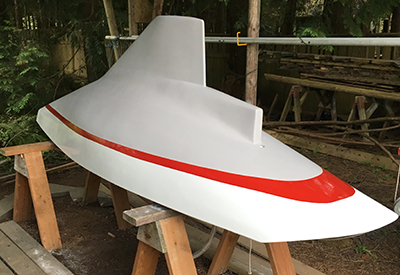 With only 2 weeks before the SIN regatta we just had enough time to get the boats in the water and test sail them a few times. During the SIN regatta, we let anyone that wanted to try sailing the boats at the Friday night dingy fun races. They were a big hit and generated a lot of interest during the evening event. We have enjoyed sailing them around the Nanaimo harbor. Our longest sail was circumnavigated Newcastle and Protection Islands in a 3-hour trip. We sailed them in the Wednesday night summer fun sailing but this turned out to be a bit scary when the big boats can’t see you. Seeing who is behind you is a bit of a problem. You can’t turn around and look back unless you are flexible. I just assumed that no one can see me and just stay clear. When ever we are sailing them, people want to know about the boats and always want to take photos. It’s fun to tell people about the Mini 12 boats. Most times people are just taking photos because they have never seen a boat that looks like a RC model boat with a person siting in it.
With only 2 weeks before the SIN regatta we just had enough time to get the boats in the water and test sail them a few times. During the SIN regatta, we let anyone that wanted to try sailing the boats at the Friday night dingy fun races. They were a big hit and generated a lot of interest during the evening event. We have enjoyed sailing them around the Nanaimo harbor. Our longest sail was circumnavigated Newcastle and Protection Islands in a 3-hour trip. We sailed them in the Wednesday night summer fun sailing but this turned out to be a bit scary when the big boats can’t see you. Seeing who is behind you is a bit of a problem. You can’t turn around and look back unless you are flexible. I just assumed that no one can see me and just stay clear. When ever we are sailing them, people want to know about the boats and always want to take photos. It’s fun to tell people about the Mini 12 boats. Most times people are just taking photos because they have never seen a boat that looks like a RC model boat with a person siting in it.
We have had an exciting time fixing and sailing Thing One and Thing Two if you see us on the water just come by and say hi.

